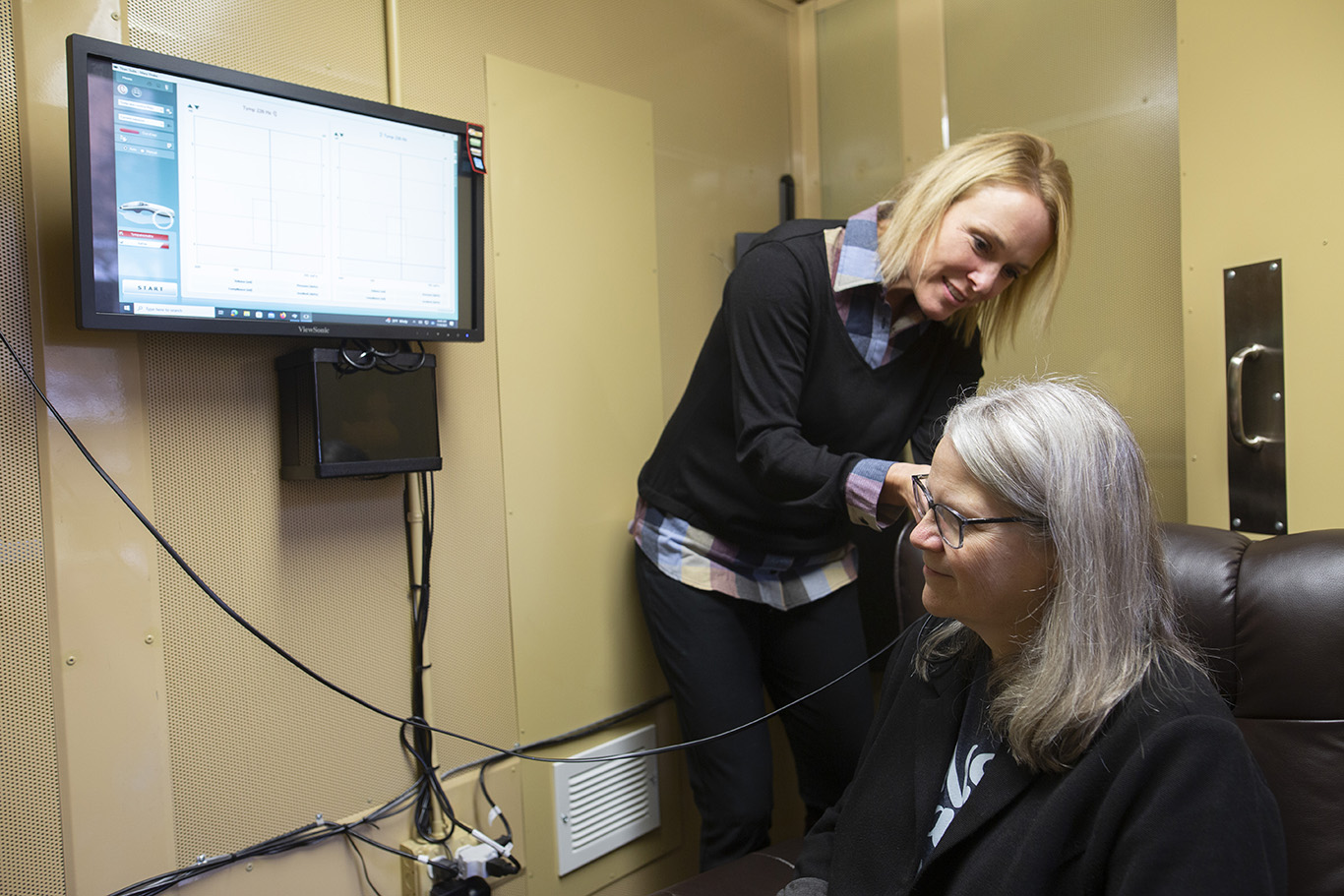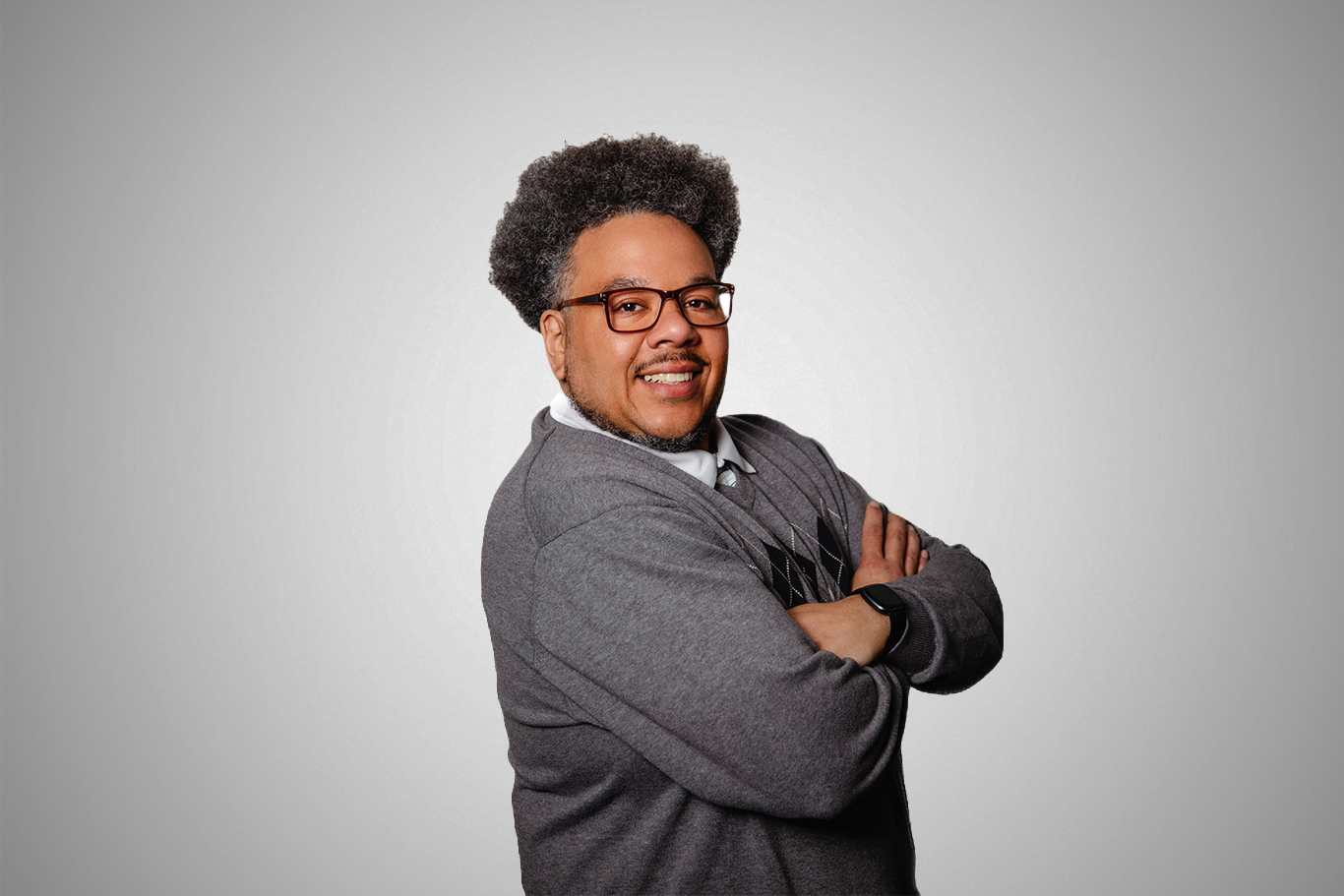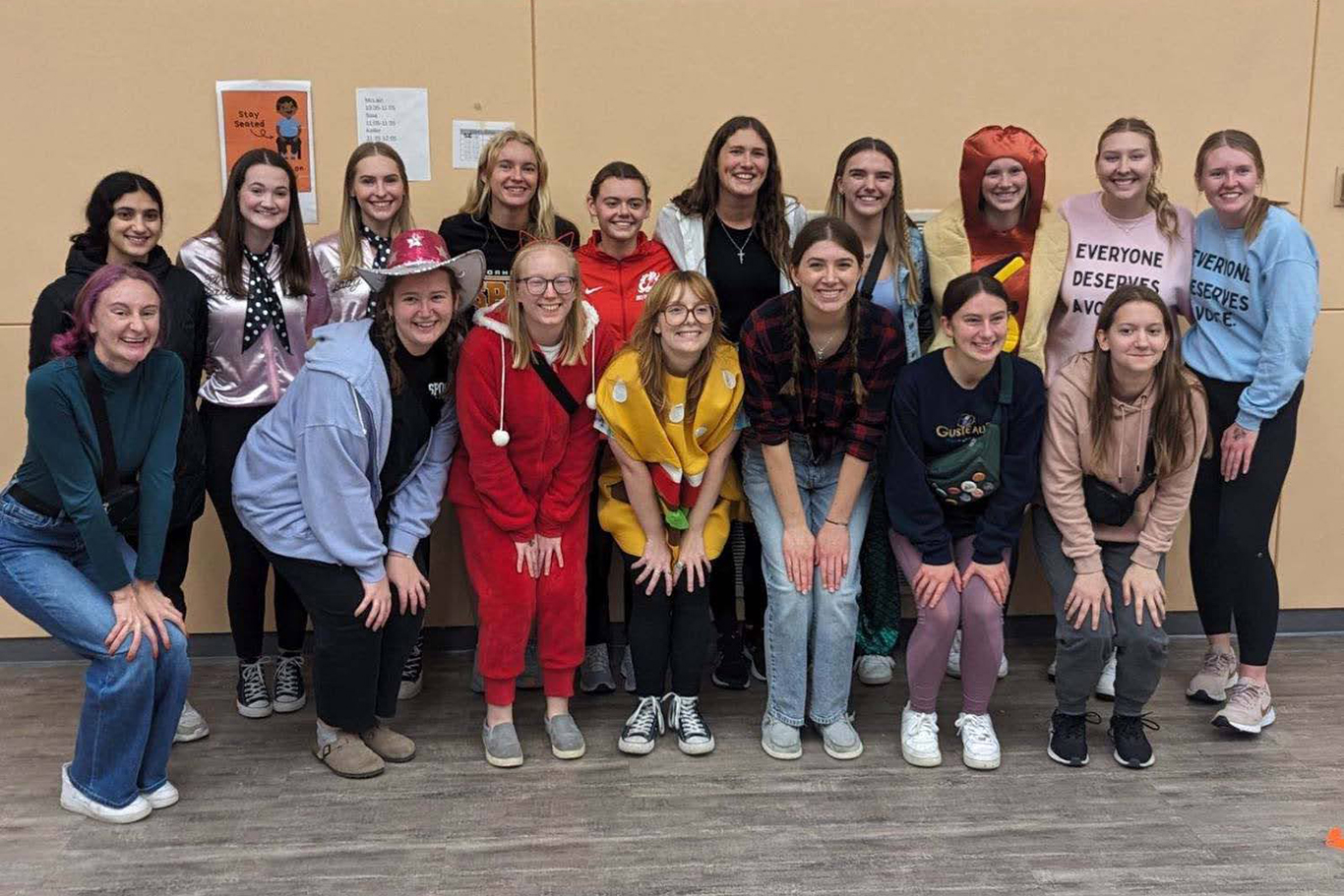Event production partnership elevates EIT program, creates new opportunities for students
Show Imaging brings industry insights, advises on curricula and technology, offers internships for students. By Martin Fredricks
Ryan Jackson was in a bind.
Not long after the beginning of the global COVID-19 pandemic, the professor in Minnesota State University Moorhead’s School of Entertainment Industries & Technology (EIT) was trying to figure out the best way to stage semi-weekly events for his students effectively.
While online video platforms provided the best option for most of his colleagues, “classes” were a little more complicated to pull off for teaching hands-on technologies, equipment and processes. Logistically, what was the best way to set everything up? Did EIT have the resources it would take? Who could he talk to for some guidance?
He knew right where to go for recommendations.
Jackson was an MSUM alumnus before he was a teacher here, and one of his former classmates works in the event production industry.
The call only lasted about an hour, but the conversation didn’t end there.
Jackson’s bind became an opportunity that would lead to a university-private sector partnership with benefits that flow both ways, including abundant opportunities for MSUM students.
Connections
Jackson started EIT in 2016 when he began noticing a trend in the industry. The skills he and his colleagues were teaching in the music business and production were becoming part of a much broader enterprise, nothing less than the entire entertainment industry.
By creating EIT, Jackson said, “We’ve continued a strong partnership with music while also opening more opportunities to students in the rest of the performing arts, fine arts, humanities, and any other area that intersects with our learning outcomes.”
COVID was a curveball in the school’s development, to say the least, not to mention basic day-to-day operations. “If everything was going to move online, we had to do some serious work quickly.”
Matt Weil was one of the guys Jackson hung out with when they were students in the early '90s. What Weil learned as an MSUM theater major set him up for work with entertainment companies and as a freelancer handling just about every role in the event-staging process, from sound engineering to lighting to stage management. When Jackson’s call came in, he’d only been an account director for national sales with Show Imaging, a San Diego, Calif.-based events company, for a few months.
Show Imaging is a multinational event production and creative company with a strong reputation for concepting, creating and executing unique, cutting-edge live experiences. It’s put on events as prestigious as a Major League Baseball All-Star Game and Comic-Con International in San Diego, along with an expansive variety of ceremonies, commencements, concerts, corporate events and festivals around the country. Not only does Show Imaging produce the content, but it also manages the physical sites and websites, registration, monetization and just about everything else that comes with large-scale events. In addition to its San Diego headquarters, the company has facilities in Orlando, Fla., and Nashville, Tenn.
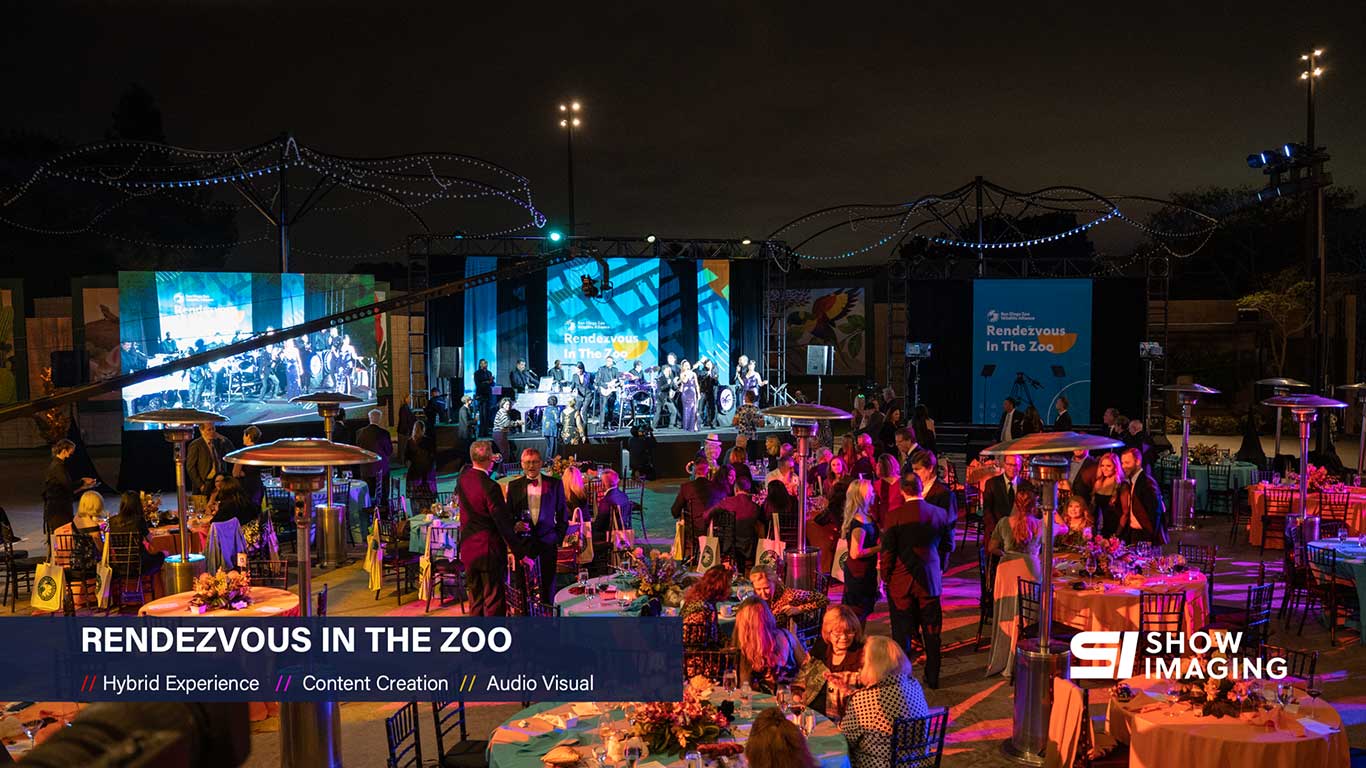
Weil’s educational background and work experience already made it a great fit, but he also shared Show Imaging’s core values – grit, integrity, heart, respect and team – all tied together with the ability to think and problem-solve on his feet.
“Matt fits our personality very well,” said Steven Evans, who founded Show Imaging in 2009. “He’s tremendously nice, very experienced and adaptable. That’s the kind of person we love on our team.”
On that first call, Weil and Jackson discussed the challenges and equipment needs for remote teaching, with Weil providing recommendations based on his in-depth knowledge of the latest tech and equipment.
“We started talking about building virtual events and environments outside of your regular stage and typical live-event venues,” Weil recalls. “He was asking about how we do this, what are the best ways to do that and what are you guys doing now, those kinds of things.”
Weil verified that Jackson and MSUM Information Technology had done all the right things as far as Zoom was concerned, and the conversation turned to anticipated technology and equipment needs for EIT’s future. As they spoke, Weil became increasingly interested in the program and, more importantly, where Jackson was taking it.
“One of the things that we started talking about is how are we refilling the pipeline for these kinds of jobs?” Weil said. “Traditional theater departments are going away and music departments are being consolidated into other departments. So where do smart, capable students learn to use new technologies and cutting-edge stuff for creating virtual environments and extended reality events?”
Weil told Jackson, “What you're teaching is what our industry needs. You need to talk to my boss.”
Working Through Adversity
Show Imaging, meanwhile, had been asking its own tough, pandemic-instigated questions.
“COVID hit us very hard,” Evans said. “We lost all of our business that fateful March.”
He and his leadership team decided to furlough all employees for a few days to conserve capital while they figured out how to move forward. A week later they called everyone back, built a virtual studio and hit the ground running. And learning.
“We had no idea what the heck we were doing. We didn't even know what Zoom was, but we're like, all right, let's build something and figure it out,” Evans said. “At that point we didn’t know if this was going to be a two-month problem, a three-year problem or something else.”
It was a brave new world, but the Show Imaging staff committed to jumping in.
“We said, ‘Okay, everybody go learn something,’ and everybody did,” Evans recalls. “Lighting people became studio managers, we learned how to use vMix (a live video streaming software) and all these other things that were new to us. And at that point, we took any work we could get.”
For example, Show Imaging built one of the first drive-through vaccination stations in the nation, then built several more. It ran power for Internet access with generators, handled K-Rail concrete barriers, signage and whatever else kept employees busy. Show Imaging also partnered with the California Center for the Arts in Escondido, Calif., to keep its employees working and make drive-in performing arts possible in the community. Show Imaging donated a stage roof to the Center and provided a stage, sound system, lighting system and big LED video screens on loan. In exchange, the Center paid for Show Imaging employees’ labor.
“It didn’t matter what it was,” Evans said, “as long as we could put our people to work.”
By the time the pandemic began to slow, Show Imaging, unlike many of its competitors, was ahead of the game in terms of live, hybrid and virtual events.
“COVID allowed us to become insanely better than we ever could have dreamed of being,” Evans said. “That’s hard to say when considering all the companies that went out of business, but we all handle adversity differently. The grit of the people in this company, to not only survive COVID but to hire people back before anyone else on this side of the country and to already be doing live and virtual shows, it’s been something special.”
That word – grit – also caught Evans’ attention when Jackson told him about MSUM.
Value Alignment
Jackson initially mentioned grit in his first online call with Darrell Henry, Show Imaging’s chief operating officer, as well as MSUM’s other core values: heart and humility.
“One of the things I need in a partner is somebody who has some sort of grounding in what I believe in and what the university believes in,” Jackson said. “I knew these were the right people when the other middle-aged white guy across the computer screen from me said, ‘Look, we've got a big problem here. The industry looks too much like you and me, and this isn't going to work long-term. It's not good for our clients and it's not good for your students. We need more diversity.”
Henry was speaking unprompted about one of the company’s and MSUM’s key initiatives: building diversity, equity and inclusion.
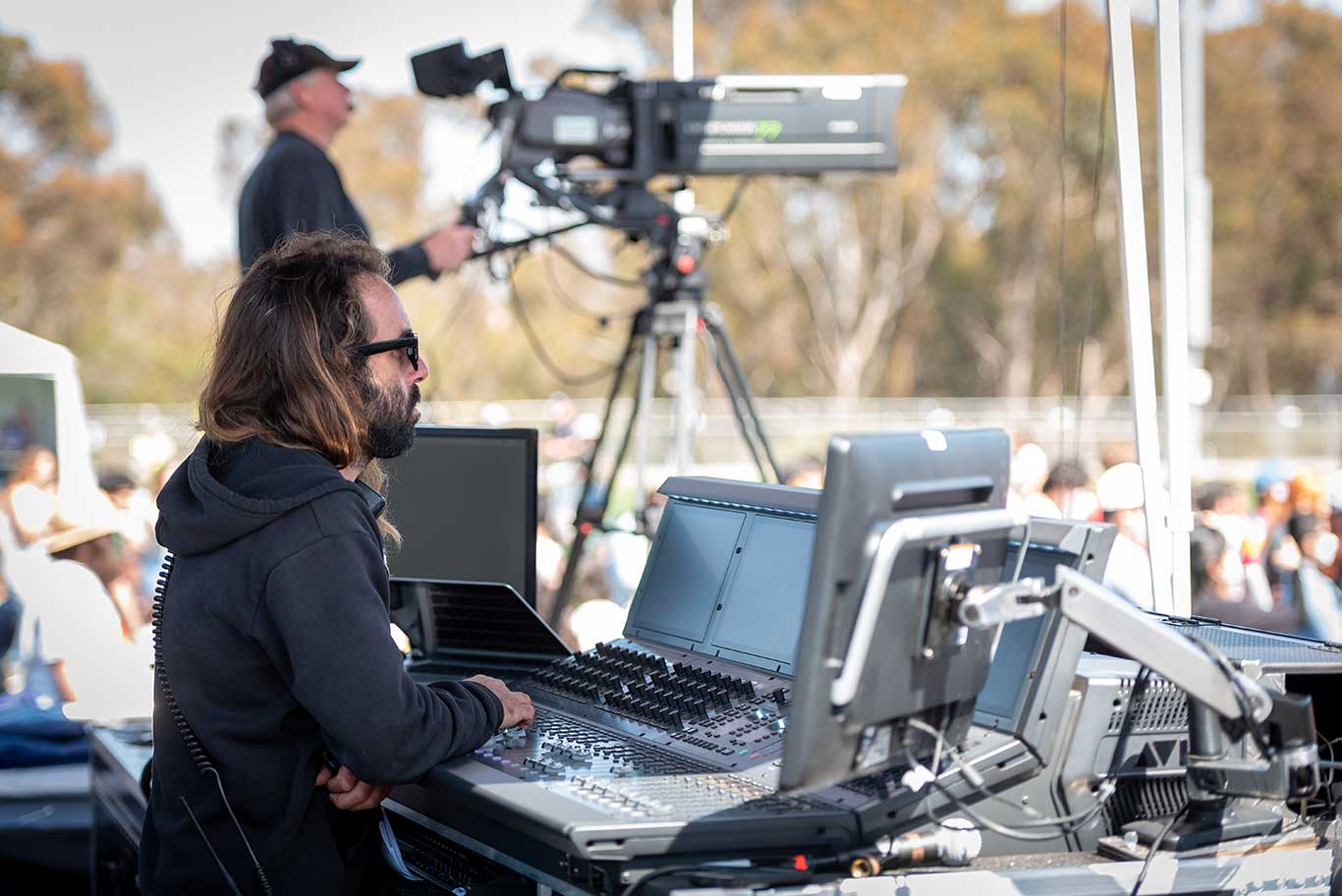
“At that point, I knew we had a basis for starting our partnership,” Jackson said.
A few months later he met Henry in person, along with Evans, Weil and Tracie Davee, a company consultant. They were in Moorhead walking around the MSUM campus, meeting with EIT faculty members, sitting in on classes and speaking directly with students.
One student in particular sticks in Evans’ mind.
During an ethics class, the student was on Zoom and the conversation about diversity, equity and inclusion in the industry obviously resonated. Later, the student attended an in-person open forum to continue the discussion with the Show Imaging leaders.
“For me, it was a really impactful moment,” Evans said. “It reminded me that even though we're not doing enough right now, the words and where we're committed to going still matter. I had to be reminded that, as it was when we started down this path of trying to change our company and industry, nothing happens overnight. No action is unacceptable, so you have to start doing.”
Mutually Beneficial Partnership
The Show Imaging-EIT collaboration hasn’t come together overnight, but it’s moving forward with purpose.
Continuing discussions have focused on how to work together to create a more diverse industry, what learning outcomes are needed to prepare students for any of a wide range of disciplines within entertainment, how MSUM can equip students for specific opportunities at Show Imaging and so on.
“My end of this deal is to help Show Imaging create a system they can use to approach others,” Jackson said. “EIT and our student population are such that we’re nimble and can react very quickly to changes in technology and method.”
Meanwhile, Show Imaging has made concrete commitments to help train EIT faculty, keep curricula up to speed with the latest technology and equipment developments, guest teach classes on site, and offer paid internships for MSUM students in San Diego or one of its other offices.
To kick off the show, so to speak, the company invited an MSUM student and an EIT faculty member to help produce the Under the Big Sky Festival in Whitefish, Mont., July 15-17.
“It seems like there are a lot of people in the Midwest who don’t have an opportunity to come out to Southern California or Orlando or Nashville or to help produce a country music festival in Montana,” Evans said. “We have jobs, and we have the desire to allow people, even if they're not seasoned industry professionals, to come be a part of it.”
Make Sure Your Story Is Heard
Let us know how your life has been changed by being a Dragon: tell us your MSU Moorhead story today!
Send Us Your Story
